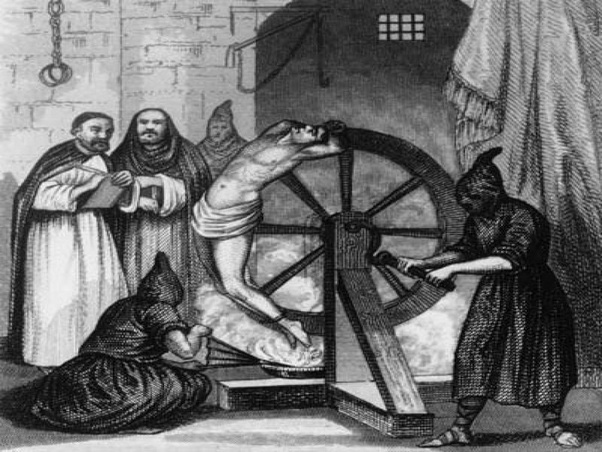A growing number of smart Catholic thinkers are touting integralism, which rejects liberal democracy in favor of a Catholic confessional state privileging the church. Its enthusiasts insist it’s not theocracy since the church would not directly govern. But the church would be legally paramount in religion.
A recent integralist manual declares that “the temporal power may use bloody means, even capital punishment, when acting on its own authority: within Christendom it may also do this against spiritual offenses like heresy if they gravely harm the common temporal good.”
Almost certainly most USA integralists would disavow harsh measures against religious dissenters under their imagined confessional state. But presumably if they actually want to implement an integralist vision, dissenters would be legally restricted in some ways. At a recent integralist conference an audience member asked if it was just “tough luck” for dissenters under integralism. “Yes,” she was told, amid laughter.
At least there was clarity. Such talk about implementing a confessional state in America sounds crazy to most. Why fret over such an impossibility? So few now advocate it, after all.
I’m not losing sleep over a confessional state in America any time soon. But I am distressed by growing numbers of many often smart thinkers who despair of American democracy and ponder non-democratic alternatives. The conversation by itself is corrosive. Many intellectually inclined young men seem drawn to integralism’s bracing agenda, as young men in every place and time are attracted to exacting and impractical political visions.
Among the dangers of integralism and related illiberalisms is they potentially sideline intellectual life whose service and vitality are needed to renew our democracy. Mainline Protestantism sustained our democracy for most of our history but is now sadly spiritually and intellectually moribund. Evangelicalism is spiritually entrepreneurial but as a mostly modern movement is still intellectually unequipped to offer needed leadership in public theology.
In recent years traditional Protestants and Evangelicals have often relied on Catholic thinkers and Catholic thought to articulate the Christian case for democracy, human rights and religious freedom. IRD, founded 40 years ago, even though mostly Protestant focused, relied heavily on Catholic thinkers. We still do, gratefully. If a significant number of traditional Catholic thinkers and their acolytes are distracted into integralism, the intellectual loss is suffered by all traditional Christians in America.
Here’s another danger. If integralists believe USA democracy is founded on erroneous and unsustainable premises, they are no longer invested in its success. They even potentially begin to welcome crises and adversities that damage our democracy with hopes that the chaos will advance their vision.
The appeal of integralism to religious traditionalists is rooted in deep concerns about aggressive secularism and social hostility to traditional religion. In integralist and other illiberal mythology, which is largely nostalgic Utopianism of the past, liberal democracy is the doomed fruit of secular enlightenment rationalism intrinsically at odds with Christianity. Some integralists wax nostalgic about the medieval social order, about the Hapsburgs, the Holy Roman Empire, early French and Spanish kings.
They sacralize old pre-Reformation Christendom in ways not dissimilar to how Islamists romanticize the ancient caliphate. Such stuff is fantasy, not reality based in real history. Every modern vice and form of decadence also existed in those past civilizations, accompanied by cruelty and tyranny, and unaccompanied by the comforts of modern medicine, science and technology, plus notions of human rights with restraints on state coercion and on ecclesial power in civil law.
Anglo-American liberal democracy over 400 years has sought to escape the chains and tortures of ancient regimes by limiting and dividing state power and by reducing and ultimately refusing civil authority to ecclesial institutions. Our tradition is not rooted in hostility to religion but in a mistrust of human nature rooted in the Bible and validated by human experience. Nobody, no matter how titled or “holy,” can be entrusted to kill, torture, jail, fine or disenfranchise “heretics.” Nobody with civil authority can be reliably trusted with absolute power to determine accurately God’s will for civil society.
Christianity in the Anglo-American tradition has across centuries embraced liberal democracy as the best alternative to authoritarian and theocratic alternatives. It was wary of kings, bishops, presbyters and all others who, if allowed, would become tyrants even amid prayers and hymns. Churches freed from state control or entanglement are better able to gain genuine converts and influence wider society through persuasion not coercion. This version of liberalism is not sterilely secular but originates in a biblical notion of humans as divinely ordained to self govern as viceroys of their Creator. America’s free churches, unattached to civil power, helped build history’s greatest political order, far exceeding in prosperity, natural rights, justice, decency and piety, any medieval kingdom.
Of course in every society the genuinely devout are a minority, and even they fail to uphold their faith evenly. In the city of man justice and righteousness are at best shadows of the heavenly versions. Wisdom and patience accept this paradox amid tragedy. Perfectionism and zealotry demand fuller justice and more absolute righteousness in this world, even if wrought through manacles and chains. Such zeal is more dangerous than the vice it strives to exterminate. Heresy hunters, if weaponized, are always to be feared.
The integralists with other utopians and zealots should pause and consider where they are. America will and should never be the Holy Roman Empire. Not will it ever, thank God, imitate modern dictators like Franco and Salazar whom some integralists admire. But it can become healthier, more just, and more decent if people who claim faith will pray and labor to advance what their religion at its best teaches.
In his famous promise to the Jews of Newport, President George Washington exceeded in wisdom and in Christian insight any Holy Roman emperor or medieval monarch:
For happily the Government of the United States, which gives to bigotry no sanction, to persecution no assistance requires only that they who live under its protection should demean themselves as good citizens, in giving it on all occasions their effectual support.






Comment by Gary Bebop on May 27, 2021 at 11:45 am
Thanks, Mark, for this discussion. Ponder a state that once was an effective democratic order becoming a devilish realm of mandates, hidden manipulations, grotesque inversions of meaning, canceling its national history and the commitments of its founders. Ponder what can be done about it when resistance to this development is “evil.”
Comment by Mary Bass on May 28, 2021 at 10:46 am
Thanks for this excellent and timely article, Mark.
Comment by Salvatore Anthony Luiso on May 28, 2021 at 10:02 pm
Thank you for this article. It is disconcerting that so many “smart Catholic thinkers” are integralists. Apparently dissatisfaction and despair over democracy has driven them to delusion. Even if integralism were ideal, I see no reason to believe that America will ever again have a confessional state. Especially a Catholic one, seeing that traditionalist Catholics are not only a small minority of the population, they are a minority within the Catholic Church in America. They are not only a distraction: they justify the fear and the belief that conservative Christians in America are theocrats.
Comment by Loren J Golden on June 1, 2021 at 8:00 pm
“But Jesus called them to him and said, ‘You know that the rulers of the Gentiles lord it over them, and their great ones exercise authority over them. It shall not be so among you. But whoever would be great among you must be your servant, and whoever would be first among you must be your slave, even as the Son of Man came not to be served but to serve, and to give his life as a ransom for many.’” (Mt. 20.25-28, Mk. 10.42-45, Lk. 22.25-27)
“A recent integralist manual declares that ‘the temporal power may use bloody means, even capital punishment, when acting on its own authority: within Christendom it may also do this against spiritual offenses like heresy if they gravely harm the common temporal good.’ … At a recent integralist conference an audience member asked if it was just ‘tough luck’ for dissenters under integralism. ‘Yes,’ she was told, amid laughter.”
The Roman Catholic Church does not have a good history when it comes to integrating the Church and State. Men seeking secular power found an avenue to it through the offices of the Church, leading to ecclesiastical corruption, such as that against which Martin Luther protested when he nailed his 95 theses to the door of the Church at Wittenberg. Men who sought to reform the Roman Church from within, such as Peter Waldo, John Wycliffe, Jan Hus, and the early Protestant Reformers were wrongly condemned as heretics and persecuted by every means at Rome’s disposal. English Catholic Queen Mary I earned the title of “Bloody Mary” because of the execution of a great many Protestant clergymen under her less-than-benevolent reign (1553-1558). French Protestants under Catholic monarchs, such as Louis XIV, suffered far worse. And in Spain, the Inquisition lasted well into the 19th Century. Christ’s admonishment to His disciples who were arguing about which of them was the greatest was clearly lost on the Roman Church during the latter centuries of Catholic Church/State Integralism, and now “a growing number of smart Catholic thinkers” want to bring it back? When Winston Churchill famously quipped, “Those that fail to learn from history are doomed to repeat it,” he must have had these “growing numbers of many often smart thinkers” in mind!